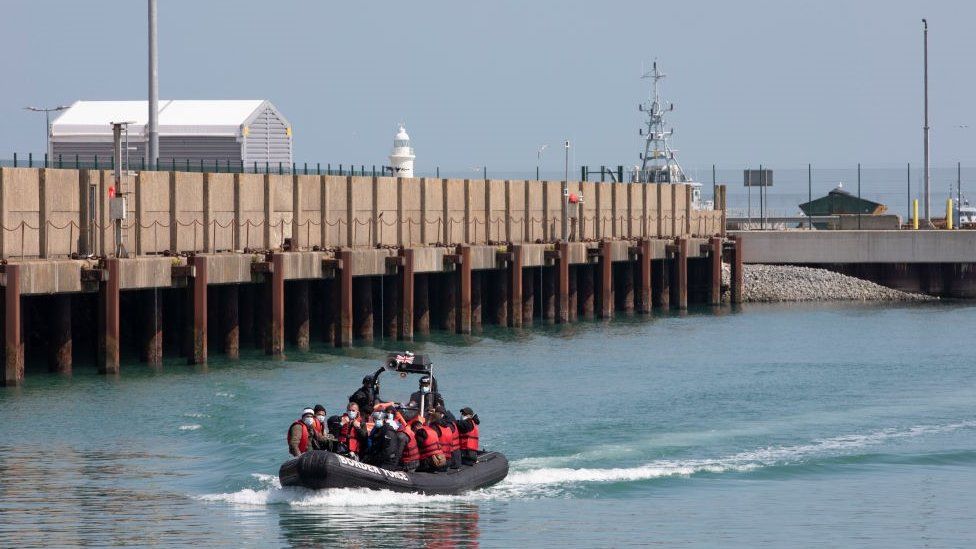ARTICLE AD BOX
By Lauren Turner
BBC News
 Image source, Getty Images
Image source, Getty Images
A group of people, thought to be asylum seekers, arriving at Dover (file image)
Campaigners against the government's policy to send migrants to Rwanda say they will now take their fight to the Court of Appeal on Monday.
It comes after the High Court said the first flight to take asylum seekers from the UK to Rwanda could go ahead.
About 31 people have been told they could be on that flight on Tuesday, with more planes to go later this year.
The Prince of Wales has been caught up in the row after two papers reported he had called the policy "appalling".
The prince is travelling to the east African country later this month to represent the Queen at the Commonwealth Heads of Government Meeting being held in the capital, Kigali.
Clarence House, which represents the prince, said it would not comment on "supposed anonymous private conversations" and that he remains "politically neutral".
Under the policy, some of those entering the UK illegally will be flown to Rwanda to apply for asylum there.
The government hopes the scheme will discourage asylum seekers from crossing the English Channel, with more than 10,000 people making the dangerous sea journey so far this year.
Speaking at the High Court on Friday, Mr Justice Swift said there was a "material public interest" in Home Secretary Priti Patel being able to carry out her policies. He said he did not consider there was any evidence asylum seekers would be ill treated.
But he said there would be a full judicial review, where the High Court will hear a challenge to the policy as a whole, before the end of July.
The first claim had been brought by lawyers on behalf of some asylum seekers, alongside the Public and Commercial Services Union (PCS) which represents more than 80% of Border Force staff, as well as groups Care4Calais and Detention Action.
Ms Patel has praised the judgement, with Prime Minister Boris Johnson calling it "welcome news".
Campaigners who brought the case have expressed concern for the welfare of people set to be "forcibly deported". They had wanted to block the first flight from leaving, as well as individual people being placed on it.
One asylum seeker - an Iranian ex-police commander who has been held at a detention centre since arriving in the UK in May - has said he fears being killed by Iranian agents in Rwanda. He has been told he will be deported on Tuesday.
Conservative MP Peter Bone, former chairman of the all-party group against human trafficking, said he believes the scheme will work.
"These people smugglers - they're just out to make money. They don't want to get caught and they don't want to do anything difficult," he told BBC Radio 4.
"What's happening at the moment is really easy for them.
"If you make it the fact that in reality, people are going to finish up in Rwanda and not the United Kingdom, people will not decide to leave France, will not pay them £10,000 - therefore there won't be the demand so they'll go away."
The policy will see people given accommodation and support in Rwanda while their asylum application is being considered by the country. If they are successful, they can stay there with up to five years' access to education and support.
Those who fail in their asylum bids in Rwanda will be offered the chance to apply for visas under other immigration routes if they wish to remain in the country, but could still face deportation.
Mr Justice Swift said part of the case to block the initial flights focused on the argument that Ms Patel's "decision to treat Rwanda as a safe country is either irrational or based on insufficient investigation".
He said this argument, along with other parts of the case, would be heard with evidence at the full judicial review, to be held across two days before the end of July.
A judicial review sees a judge looking at how a decision, or action, has been made by a public body. It does not consider whether the decision itself is correct or not.
James Wilson, deputy director of campaign group Detention Action, said it was disappointed, but added there were "some positives" from the case - noting that six of the eight original claimants had their removal orders withdrawn by the Home Office in advance of the judgement.
Clare Moseley, founder of Care4Calais, said the charity was "deeply concerned for the welfare of people who may be forcibly deported to Rwanda, a fate that could profoundly harm their mental health and future".
The PCS union has called for urgent talks with Ms Patel to discuss the removal policy following the ruling.
Up to 130 people so far have been notified they could be flown to Rwanda at some point in the future.

 2 years ago
28
2 years ago
28








 English (US)
English (US)